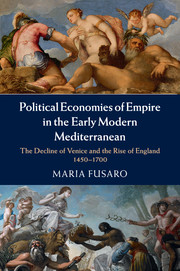Crossref Citations
This Book has been
cited by the following publications. This list is generated based on data provided by Crossref.
Hale, Matthew
Raymond, Graham
and
Wright, Catherine
2016.
List of publications on the economic and social history of Great Britain and Ireland published in 2015.
The Economic History Review,
Vol. 69,
Issue. 4,
p.
1309.
ONGARO, GIULIO
2016.
Protecting the commons: self-governance and state intervention in the Italian States during the sixteenth and seventeenth centuries.
Continuity and Change,
Vol. 31,
Issue. 3,
p.
311.
Pizzoni, Giada
2017.
British Catholics’ commercial strategies in times of international warfare (1688–1705).
The Seventeenth Century,
Vol. 32,
Issue. 1,
p.
81.
Shaw, Christine
2018.
The Encyclopedia of Diplomacy.
p.
1.
Cecchini, Isabella
2018.
Financing in Europe.
p.
47.
Alfani, Guido
and
Di Tullio, Matteo
2019.
The Lion's Share.
Fattori, Niccolò
2019.
Migration and Community in the Early Modern Mediterranean.
p.
37.
Fusaro, Maria
2020.
The Burden of Risk: Early Modern Maritime Enterprise and Varieties of Capitalism.
Business History Review,
Vol. 94,
Issue. 1,
p.
179.
Maffi, Luciano
2020.
Private Bankers in the Italian 19th Century.
p.
1.
Özden Mercan, F.
2020.
A diplomacy woven with textiles: Medici-Ottoman relations during the late Renaissance.
Mediterranean Historical Review,
Vol. 35,
Issue. 2,
p.
169.
2021.
Protestantische Händlernetze im langen 18. Jahrhundert.
p.
621.
Рябова, М.А.
2021.
CULTURES OF EMPIRE: RETHINKING VENETIAN RULE, 1400–1700: ESSAYS IN HONOUR OF BENJAMIN ARBEL / ED. BY G. CHRIST, F.-J. MORCHE. Leiden; Boston: Brill, 2020. XXXII+484 p. (The Medieval Mediterranean: Peoples, Economies and Cultures, 400–1500; Vol. 122)..
Средние века,
p.
210.
Pizzoni, Giada
2022.
British Power in the Mediterranean: Sea Protests and Notarial Practice in Nineteenth-century Malta.
The Journal of Imperial and Commonwealth History,
Vol. 50,
Issue. 5,
p.
829.
Calafat, Guillaume
2022.
For a “Livorno-on-Thames”: the Tuscan model in the writings of Henry Robinson (1604-1673?).
The Seventeenth Century,
Vol. 37,
Issue. 4,
p.
535.
2022.
Protestantische Händlernetze im langen 18. Jahrhundert.
p.
621.
Centenero de Arce, Domingo de Guzmán
2022.
Resistencias a la primera globalización. Sedas chinas y persas, situación americana, contestación castellana y dinámicas imperio-comerciales durante el reinado de Felipe III.
Cuadernos de Historia Moderna,
Vol. 47,
Issue. 1,
p.
87.
Mailes, Alana
2022.
Singing Nuns and Soft Power: British Diplomats as Music Tourists in Seicento Venice.
Religions,
Vol. 13,
Issue. 4,
p.
330.
MERCAN, Özden
2022.
Toskana Elçisi Neri Giraldi’nin İstanbul’daki Maceraları (1598).
Hacettepe Üniversitesi Edebiyat Fakültesi Dergisi,
Vol. 39,
Issue. 2,
p.
433.
Stapelbroek, Koen
and
Tazzara, Corey
2023.
The Global History of the Free Port.
Global Intellectual History,
Vol. 8,
Issue. 6,
p.
661.
Morozov, Vladimir M.
2023.
Network Diplomacy.
p.
13.



